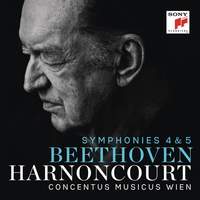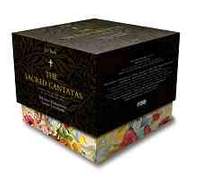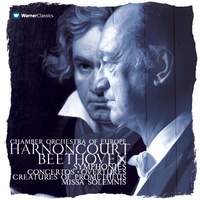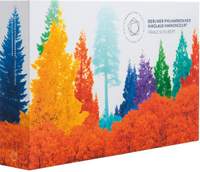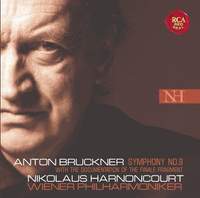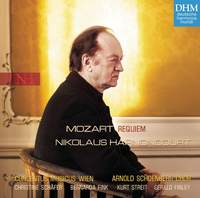Obituary,
Nikolaus Harnoncourt (1929-2016)
 The Austrian conductor and cellist Nikolaus Harnoncourt has died aged 86, just four months after announcing his retirement. After five decades at the forefront of the historically-informed performance movement, he leaves behind a vast legacy not only in terms of his extensive and wide-ranging discography, but also his influence on subsequent generations of musicians.
The Austrian conductor and cellist Nikolaus Harnoncourt has died aged 86, just four months after announcing his retirement. After five decades at the forefront of the historically-informed performance movement, he leaves behind a vast legacy not only in terms of his extensive and wide-ranging discography, but also his influence on subsequent generations of musicians.
Born in Berlin on 6th December 1929, Johann Nikolaus Graf de la Fontaine und d’Harnoncourt-Unverzagt (he was descended from the Huguenot and Hapsburg dynasties, but would eschew the cult of personal glamour and often authoritarianism which characterised many of his contemporaries on the podium) grew up in Graz and was educated in Vienna, where he began his musical life as a cellist, joining the Wiener Symphoniker in 1952. It was here that he would meet his wife, the violinist Alice Hoffelner, with whom he founded Concentus Musicus Wien the following year: dissatisfied with the dominant one-size-fits-all approach which was then frequently applied to repertoire from Handel to Bruckner, they began to explore the possibilities presented by working with period instruments and researching original performance practice.
The ensemble gave no public performances for its first five years, focusing instead on intensive rehearsal and research before making their official debut in Vienna in May 1957 and waiting another five years before making their first venture into the studio with a recording of Purcell. Several major Bach recordings would follow shortly afterwards, paving the way for one of Harnoncourt’s greatest achievements – the first complete series of the Bach cantatas on disc to use authentic instruments and performance techniques, recorded with his friend and colleague Gustav Leonhardt between 1971 and 1990, with unbroken boys’ voices (rather than adult female singers) taking the soprano and many of the alto parts in both a solo and choral capacity. (Twenty-five years on, when superb historically-informed Bach discs abound, these recordings have certainly stood the test of time: in 2013, when the set was re-released on USB, The Guardian’s Andrew Clements marvelled anew at the ‘wonderfully uncomplicated directness about the singing and playing’.)
Although his music-making was consistently characterised by diligent scholarship and historical awareness, Harnoncourt was never wedded to authenticity for authenticity’s sake, seeing it rather as a catalyst for revitalising and often defamiliarising canonical works that had become lacquered over with performance-traditions of intervening generations. To listen to his recordings was almost always to hear even the best-known works anew in some way; he had a supreme gift for throwing light on inner details and countermelodies which often get lost in thicker textures, and for playing with light and shade on a variety of scales (witness his polarising Salzburg recording of Le Nozze di Figaro, which threw the darker elements of Mozart and da Ponte’s ‘mad day’ into relief far more so than any other account on disc). Baroque music remained a focus throughout his long career, but he would go on to apply his particular brand of radical traditionalism to the symphonies of Beethoven, Brahms, Bruckner and more, and (perhaps somewhat surprisingly, given his serious, almost donnish persona) was a wonderfully spirited interpreter of the music of Offenbach and the Strauss Family, with several memorable New Year’s Day Concerts in Vienna to his name.
Though his public appearances understandably became less frequent over the past decade, Harnoncourt continued to conduct (and, crucially, to reappraise) until very recently: his final recordings, of the Fourth and Fifth Beethoven Symphonies, were made only ten months ago, with fresh insights, emphases and imagination in evidence throughout. He died peacefully at home in Austria on Saturday, surrounded by his family, and is survived by his wife Alice and three children, including the eminent mezzo Elisabeth von Magnus.
Nikolaus Harnoncourt - some seminal recordings
Concentus Musicus Wien
Available Formats: CD, MP3, FLAC, Hi-Res FLAC
Leonhardt Consort & Concentus musicus Wien, Nikolaus Harnoncourt & Gustav Leonhardt
Available Format: 60 CDs
Chamber Orchestra of Europe
Available Formats: MP3, FLAC
Berliner Philharmoniker
Available Formats: MP3, FLAC, Hi-Res FLAC
Wiener Philharmoniker
Available Formats: MP3, FLAC
Christine Schafer (soprano), Bernarda Fink (mezzo), Kurt Streit (tenor), Gerald Finley (baritone) Concentus Musicus Wien, Arnold Schoenberg Choir
Available Format: CD


